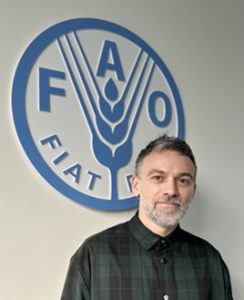
Dr. Ludovic Plee
FAO Emergency Management Centre
Italy
Biosketch
Dr. Ludovic Plée has been serving as Manager of the FAO Emergency Management Centre (EMC) in Rome since 2019. The EMC is leading, with the support of FAO technical units and the Office of Emergency and Resilience, global, regional and national activities to increase emergency management capabilities for better resilience and response to agri-food systems threats affecting livelihoods. Prior to managing the FAO EMC, from 2016 to 2019, Dr. Plée served as Project Manager in the FAO office in Jerusalem, working on Sanitary and Phytosanitary capacity development for the West Bank and the Gaza Strip. He was before then, from 2009 to 2016, assigned as a Response Planning officer to the FAO Crisis Management Center for Animal Health (previous EMC name), seconded by the French Ministry of Agriculture. He was deployed in many emergency response missions on various transboundary animal diseases outbreaks (zoonotic and non-zoonotic) as well as training national veterinary officers in FAO countries on good emergency management practice as well as on contingency planning. From 2006 to 2009, he worked in the French Food Safety Agency in Maisons-Alfort, France, as an emergency qualitative risk assessor on animal health issues affecting public health and food safety and, from 2003 to 2006, was a Veterinary Advisor in Paris, France, for the headquarters of the main Farmers Group, les Groupements de Défense Sanitaire (or GDS), especially on veterinary legislation, risk communication and disease awareness. He also serves as a lecturer in the French veterinary school in Nantes and in the French School of the Veterinary Services in Lyon on qualitative risk assessment and emergency management. Dr. Plée earned a Diploma of Veterinary Medicine from the Veterinary School in Nantes, France, and a Masters of Science in Epidemiology and Environmental Health with honours at Colorado States University, Fort Collins, CO, USA.
Abstract
Shifting the emergency management paradigm towards a system-wide approach to be better prepared to the risk of emerging or re-emerging health threats.
• Lessons learnt from the global COVID-19 response highlighted the lack of effective emergency preparedness mechanisms. Each emergency operation system worked independently and was confined within national borders and disciplinary silos impeding a coordinated response capacity to address this new challenge at the pace and scale required.
• Data from the Food and Agriculture Organization of the United Nations (FAO) Progressive Pathway for Emergency Preparedness (PPEP), a self-assessment process and tool that has been applied by over 60 FAO member countries to assess their animal health emergency preparedness since its launch in May 2022, showed that the vast majority of participating countries are still unprepared for potential threats.
• The global challenge to better prepare for the next pandemic remains. Preparedness for any emerging threat requires a shift in classical views and paradigms. Emergency management systems, like other systems, should be adaptable and evolve from traditional siloed and single-threat approaches which lack flexibility during crises, to system-wide integrated approaches with increased efficiency and adaptability to future and emerging threats.
• Integrated, adaptive systems will allow countries, regions and the world not only to effectively address current and emerging threats but will likely be more resource-efficient to address the emerging threats arising from global crises.
